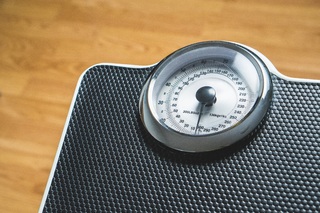How to lose 3 to 7 kilos?
To lose 3 to 7 kilos, it suffices a priori to rebalance your meals and to activate a little more. If you can't do it alone, it is better to call on a health professional, rather than embark on a draconian diet.
Eat less and move more
There are all kinds of reasons for having extra pounds: from an unbalanced diet to an overly sedentary life, through all the life events that can impact weight: pregnancy, menopause, advancing age, smoking cessation , taking certain treatments (cortisone for example), hormonal imbalance... The remedy is always the same: a temporary reduction in caloric intake, associated with an increase in energy expenditure. Once the excess pounds have been lost, in order not to regain them, it will be necessary to continue to monitor the contents of the plate, especially if the cause of the overweight is mainly food.
Dietary advice to lose between 3 and 7 kilos
To lose weight without cravings or deficiency, adopt the following menus:
Breakfast
- An unsweetened drink: coffee, tea, herbal tea;
- A cereal food preferably rich in fibre: wholemeal bread, with cereals or bran, or breakfast cereals such as All'Bran, oatmeal, muesli. On the bread, spread light, light butter 15 or 40% fat, or low-sugar jam;
- A dairy product, semi-skimmed milk, plain unsweetened yogurt (possibility of sweetener), or cottage cheese with 0 or 3% MG;
- Possibly a fruit.
At lunch and dinner
- Raw vegetables and/or cooked vegetables: count a tablespoon of oil per person for vinaigrettes, a teaspoon of oil or light butter or a tablespoon of light cream in hot vegetables;
- At least for one of the two meals, a meat (avoid lamb and the skin of poultry) or a fish or 2 eggs or 2 slices of ham: count 100 to 150 g according to your appetite;
- Try cooking these foods without fat, or with just a teaspoon of oil or margarine;
- A dairy product, for example a portion of cheese with one of the two meals (30 to 60 g), and a dairy product with the other meal: plain unsweetened yoghurt or 0% fat fruit yoghurt;
- A fruit ;
- Bread and/or starch: pasta, rice, potatoes, semolina, wheat, corn, pulses.
At snack
Better to taste than to crack at the end of the day. Depending on your feeling of hunger, you can settle for a fruit or a 0% dairy product, or on the contrary take a small, more substantial break: an individual bag of biscuits or an individual chocolate bar, with a glass (or a briquette) of semi-skimmed milk, or two slices of country bread with two portions of light spreadable cheese (maximum 10% fat) or a slice of ham.
Cheat Meal: are "cracks" allowed?
Meats, fried foods, dishes with sauces, pizzas and quiches, pastries, pastries, ice creams, sweets... All these foods are high in calories. We must not delete everything, at the risk of getting frustrated and eating too much later, but we must limit. For example, if you spontaneously consume 5 extras per week, try to settle for 2-3 per week.
Same thing, for energy drinks, wines and other alcohols, sodas, fruit juices, divide your consumption by at least two.
Sport to lose weight effectively
Physical activity affects weight in two ways. On the one hand, you burn more calories walking than sitting in front of the TV, logical! On the other hand, the regular practice of a sport makes it possible to gradually increase muscle mass. And, the more muscular you are, the more you have a high energy requirement: in the diet phase, it helps to lose weight, in the stabilization phase, it allows you to indulge in some food fantasies without consequence.
Everything is an excuse to move more:
- go shopping on foot;
- walk the dog more;
- if you take public transport, walk for one to two stations, climb the stairs;
- garden;
- you can also focus family leisure on physical activity: walks or bike rides, pool sessions, football or table tennis matches.
If you decide to (re)take up a sport, do not forget to seek the advice of your doctor, or even to do a stress test (essential after 40).
Diet: what if it doesn't work?
A reasonable rate of weight loss is around 500 g per week, or 2 kilos per month. If it's a bit quicker at first, and then fades out, that's fine. If you continue to lose 1 kilo per week or more, it's too fast: increase your proportions of bread and starches, even your frequency of extras. If, on the other hand, you lose 1 kilo per month, it may seem long and unmotivating, but as long as it works, you might as well not reduce the energy intake of the diet. If you do not lose weight at all, you must consult your doctor, to understand the cause of these extra pounds and a dietician, who will concoct a tailor-made food program without deficiencies.
Your difficulty in losing weight may simply come from the fact that you have followed several diets in previous years: the more restrictions you have made, the less the body responds well to diets. This is why, instead of embarking on a protein diet or an "artichoke diet", which will further aggravate the situation in the medium term, it is absolutely necessary to get help from a professional.


Comments
Post a Comment